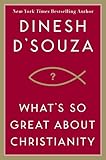In commentaries one through ten, I've taken first Dennett's position, and then D'Souza's position, point by point.
Before continuing with the rebuttals, I'd like to summarize their positions so far.
Throughout these commentaries, I've made a distinction between scientific rhetoric—arguments aimed at our understanding of the issues involved—and political rhetoric—arguments aimed at our motivations to choose one side or the other.
Both Dennett and D'Souza use both types of rhetoric.
I've also distinguished between arguments that were sound, and arguments that weren't. Both debaters use both of these, as well.
But there is a difference.
Dennett uses more scientific rhetoric than D'Souza, and his arguments tend to be sound. On the other hand, D'Souza tends to prefer political rhetoric, and his arguments tend not to be sound.
The reason for this pattern can be explained, in part, by the fact that they mean entirely different things by the word "believe".
When Dennett says he doesn't believe there is a God, he means that when he examines the evidence for and against the existence of God he finds that there are lots of indications that God is a human invention, and no significant evidence that God actually exists. He sees belief as the natural consequence of his analysis of the evidence, not as a choice.
Because of this, Dennett's arguments tend to be aimed at our understanding of the evidence:
- There are many different conceptions of God, held by many different religions, and these contradict each other in various ways. "God" is not a single, clearly defined concept, based on empirical evidence, but a cultural construction.
- Religion—our source of knowledge about God—is a human invention.
- The concept of God does not stay the same, but evolves as the culture which invented it changes.
All of these points are accurate. Since Dennett is aiming at clarifying our understanding of the situation, he tends to pay attention to accuracy in his arguments.
When D'Souza says that he believes in God, he means that he has made a decision to be a member of a group which shares certain values. He sees belief as a choice, which one can make in spite of any evidence or lack of evidence.
Because of this, his arguments tend to focus on our motives for choosing a side:
- He claims that Dennett has given no citations when, in fact, Dennett did. He claims he does give citations, when he gives fewer, and less specific citations than Dennett.
- He claims that Dennett is an elitist, who holds religious people in contempt when, in fact, there is no evidence of this.
- He points out that Stalin was an atheist.
- He argues that because Augustine said something about time that is close to what modern science believes, we should believe in God.
- He argues that because the universe is the way it is, we should believe in God.
- He presents arguments based on the conflation of alternative meanings of the terms"intelligence" and "law".
- He culminates his argument with Pascal's wager, basically threatening his audience with Hell, if they don't choose his side.
Insofar as any of these arguments are sound, they don't support his side of the debate.
But since D'Souza is only aiming at influencing us to choose his side, he is not concerned with accuracy, only with the impression he is making.
The lists above are only rough summaries of the Dennett and D'Souza's positions. At the end of the series I'll provide a detailed summary, with notes.
It's important, at this juncture, to notice that D'Souza does not represent all religious people, or even all Christians. There are many Christians who would find his positions silly and even repulsive.
But he is a reasonable representative of the Christian Right—the fundamentalist conservative force which still has too much power in the United States. One only has to listen to the pronouncements of the Bush administration to detect the same complete lack of interest in clarity or accuracy—and the overriding interest in influencing opinion.
On the other hand, while it's true that the worst offenders in this regard are currently on the right, we shouldn't make too much of the fact. The moderate right, the moderate left, and the extreme left are also capable of emphasizing political rhetoric at the expense of clarity and accuracy. D'Souza's example of Stalin is a good one to remember in this regard.
The lesson to be drawn here is not a lesson about conservatives and liberals, or Christians and athiests, but about the dangers of focusing on political rhetoric to exclusion of scientific rhetoric.
Next time, the rebuttals.








